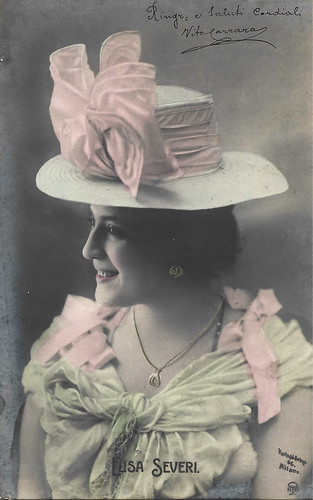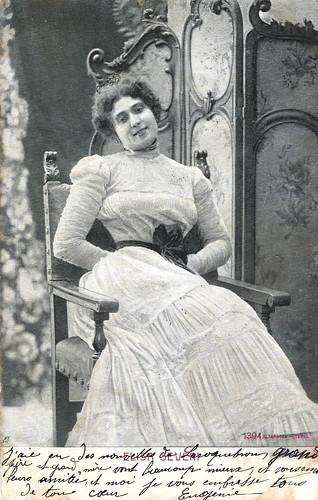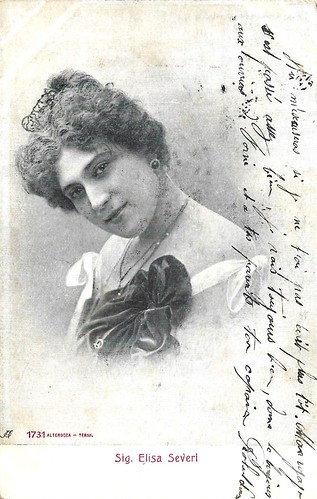
Italian postcard by NPG, no. 3. Photo: Varischi Artico & Co., Milano.

Italian postcard by NPG, no. 4. Photo: Varischi Artico & C., Milano.

Italian postcard by NPG. Photo: Varischi Artico & Co., Milano.
A splendid creature vibrating with a sentimental passion
Elisa Severi was born in1872 in Ravenna, Emilia-Romagna, Italy. She trained as an actress in Rome, where she debuted in the 1889-1890 season. She joined the Drammatica Compagnia Palladini-Talli in 1894, and headed a company with Oreste Calabresi for the 1905-1906 season, with Mercedes Brignone as one of the company's other actresses. In the 1900s Severi was a popular stage actress. She became a member of Ettore Berti's Compagnia Stabile Romana in 1912. A reviewer of her stage work called her "una splendida creatura vibrante di passione sentida" (A splendid creature vibrating with a sentimental passion).
Between 1913 and 1921, Severi appeared in twenty silent films. She made her film debut in the Film d'Arte Italiana (FAI) production La rinunzia (Ugo Falena, 1913). Alfonsina Pieri played the female lead as the wife and muse of a poet (Ettore Berti), whose stage play became a success. The poet falls in love with the leading actress, Liliana (Severi), who inspires him to write 'La Rinunzia' (The Renunciation), a drama about a wife who sacrifices herself for the glory of her husband... Pieri, Berti and Severi were all praised in the Italian press.
Severi left Berti and FAI and moved to the Turinese company Gloria, where she starred in five films. Alberto degli Abbati directed her in Circe moderna (Alberto degli Abbati, 1914), which was critically reviewed, while there was praise instead for Abbati's La contessa Fedra (Alberto degli Abbati, 1914), though the press found Severi's co-actor Carlo Gervasio overacting. Severi remained at Gloria for more leads in La corsa all'amore (Telemaco Ruggeri, 1914) and Il diritto di uccidere (Amleto Palermi, 1914). Severi did one last film at Gloria, Il bacio di sirena (Guido Di Nardo, 1915), with Mario Bonnard, who was Severi's partner in several Gloria films.
During the First World War years (1916-1918), Severi did only a handful of lesser-known films for Latin Ars, Cosmopoli Film, and Tespi Film, but after the war she acted as Herodias in Carmine Gallone's major production for Medusa Film, Redenzione/Redemption (Carmine Gallone, 1919), starring Diana Karenne as Mary Magdalene, Alberto Pasquali as Jesus, and Pepa Bonafé as Salome. Severi stayed with Gallone for his Amleto e il suo clown/On with the Motley (Carmine Gallone, 1920) in which she played the mother of the star, Soava Gallone. Her last films were for the companies Libertas, Nova Film and Unione Cinematografica Italiana, e.g. Dopo il suicidio (Giulio Antamoro, 1920) with Fernanda Negri Pouget, L'erma biffronte (Alberto Carlo Lolli, 1920) with Tilde Kassay and Lido Manetti, and lastly, Sublime rinuncia (Mario Corte, 1921), with Carlo and Olga Benetti.
In 1910, Elisa Severi had one son, editor and translator Giorgio, with journalist, editor and writer Tomaso Monicelli (1883-1946). Giorgio coined the Italian word 'fantascienza' for the Science-Fiction magazine Urania. In 1913 Tomaso Monicelli married Maria Carreri and had five children with her, among whom the famous film director Mario Monicelli. Elisa Severi died in 1930 in Rome at the age of 58. A park in Ravenna is named for her.

Italian postcard by C.R. (Compagnia Rotografica, Milano), no. 17. Postcard mailed 21-2-1904. Backside: N.P.G., Diffida.

Italian postcard by CR, no. 19. Photo: Varischi Artico & Co., Milano.

Italian postcard by Alterocca, Terni, no. 1394.

Italian postcard by Alterocca, Terni, no. 1731.
Sources: Vittorio Martinelli (Il cinema muto italiano), Wikipedia (English and Italian) and IMDb.
No comments:
Post a Comment